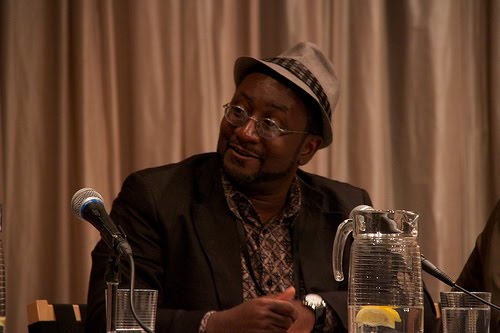Again I am honored by the Gray Lady.
Thanks,
Preston
__________________________________________
The Ecstasy and the Ecstasy
What is it about church that is so damn sexy? The question has bugged me for a long time. An erotic current runs just below the displays of rectitude and purity, despite the hard pews and organ repertory. I suspect it has to do with the congregants’ concerted effort to suppress carnality in favor of distant heavenly rewards. Denying the flesh only makes it throb harder. It’s tricky to defeat one’s own biology, especially when young. It bubbles up during sermons as eyes and thoughts wander. The nape of a boy’s neck sitting two rows up — that modest strip of naked flesh between hairline and suit jacket — can surprisingly arouse.
Sixteen-year-old Elwyn Parker, the protagonist of Preston L. Allen’s novel “Jesus Boy,” is smitten by something just as banal: the glimpse of a twice-pierced, yet unadorned earlobe. The ear belongs to Elaine Morrisohn, 42, a freshly widowed member of his black community’s church, Our Blessed Redeemer Who Walked Upon the Waters. The widow’s earlobes lend credence to rumors that she lived a life of “singular wickedness” before she accepted the Lord. As Elwyn boasts to his high school principal, in this church “we don’t drink, don’t smoke, and our women don’t wear pants.” Jewelry is forbidden, as is coffee, dancing, secular music and most forms of fun.
But these strictures do nothing to repress the congregation’s primal urges, and generations of illicit sex run through this clever and wide-ranging book in which the flesh always triumphs. “Jesus Boy” could well be titled “Jesus People,” for it is crowded with backsliders, hypocrites, horny preachers and shunned “outside” children. All the furtive copulation makes for a general kinkiness that permeates the sanctuary like cheap aftershave. In one case, a couple decides to stop fornicating and get married — only to discover they are distant relatives.
When Elwyn discovers that the girl for whom he’s harbored a long but chaste crush is pregnant, he turns to the pierced widow to explore his own impulses. He visits her just hours after her husband’s burial — she is still in her funeral dress — to ask about the sins she committed in her former life, and whether she ever feels like “yielding.” She does. And she shows him how.
Surely no one does church sexy like Allen. In his worship services, the Holy Ghost descends on women who collapse in the aisle with “spasming legs” and preachers whip their flocks into orgiastic frenzies. The middle-aged widow gazes soulfully at her teenage lover as he strokes the piano during a hymn, “so tight and so fresh and so full of juice,” and calls out an “orgasm shout” that is lost among the holiness shouts.
These people want ecstasy in heaven and on earth. They may lapse into sin, but they can’t shake religion entirely because it is their identity. They quote the Bible — yea, the King James Version — as they beat each other up. They pray before cheating and raise holy hands in the middle of a seduction. One adulterous couple, knowing their congregation will ostracize them if they go public with their liaison, reach an impasse when it comes to finding a new church. As the man ticks off denominations, the woman finds faults with each. She can’t bear to leave her spiritual home of so many years. “Love will conquer all,” her lover finally reassures her. “Love will find a way.”
“Will it?” she responds.
The sinners here take comfort in the notion that “Christ is married to the backslider,” and will forgive their trespasses “seventy times seven” (Matthew 18:22). That’s 490 times, or about one aberration every two months over an 80-year lifespan — not much. Like Ted Haggard-Jim Bakker-Jimmy Swaggart, when their hypocrisy and dirty secrets are revealed, they expect, even demand, forgiveness.
Allen’s writing is by turns solemn and funny. There is a revival scene staged by three ministers — two are African-American, one white — that is hilarious. As the “Rev’run” struts around the stage in a mint-green double-breasted suit berating the audience, the adulterous Rev. McGowan responds with tears, but the white minister leaps to his feet, slings the Rev’run aside and screams gibberish into the microphone before sprinting down the aisle and out the door. The stunned audience “pondered the role of the white minister,” Allen writes, while the two black preachers wondered who he was; neither had invited him. Was the mystery man speaking in tongues, reacting to the Rev’run’s emotional appeal or exhibiting psychosis? The reader must decide if his behavior is any more schizoid than that of the zealous sinners or sinning zealots who people this book.
Allen’s previous books include “All or Nothing,” a novel about gambling addiction (as this one is about religious addiction) and “Churchboys and Other Sinners,” a story collection in which Elwyn is a recurring character. It would be easy for “Jesus Boy” to become fluffy satire, but Allen keeps his characters real. Elwyn, who once aspired to become “a beacon unto the faithful,” becomes something much more profane. His faith wanes, but he still slips into the pews now and again to get his fix by singing the hymns he’s known since boyhood. He leaves before the sermon begins. There is nostalgia for the simple morality, the fellowship, the promise of celestial rewards. Old habits are hard to break.
by Julia Scheeres

No comments:
Post a Comment